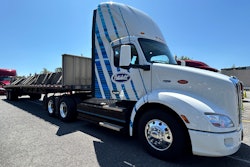Navistar International Corp., parent of International Truck and Engine Corp., and Munich, Germany-based MAN Nutzfahrzeuge AG have signed a strategic agreement to collaborate on design, development, sourcing and manufacturing of components and systems for commercial trucks, including a range of diesel engines.
U.S. Xpress Enterprises signed a six-year agreement to outsource its wheel and tire management program to Bandag Inc. The agreement covers about 5,500 tractors and 14,500 trailers.
Schneider National last month announced that it will introduce the largest pay increase for drivers and owner-operators in its 70-year history, effective Feb. 6. The package provides company drivers with an average increase of $4,000 a year and offers work-life improvements, such as more predictable work schedules and better time-at-home options, the carrier says.
Mississippi State University received a $2.3 million federal grant from the Transportation Security Administration to establish and run Highway Watch’s Emergency Planning and Education Center. The center will conduct exercises with trucking companies and organizations to assess readiness and capabilities and help the industry develop response plans for terrorist attacks and national emergencies.
J.B. Hunt retired as senior chairman of J.B. Hunt Transport Services, one of the nation’s largest truckload carriers with a fleet of nearly 10,000 tractors and 47,000 trailers. Hunt, 77, founded the carrier in 1961.
Most segments of the trucking industry told the Federal Motor Carrier Safety Administration at the end of November that mandatory electronic onboard recorders (EOBRs) would be costly and unreliable. But in a possible sign of the growing belief that EOBRs are inevitable, some major carriers – including ABF Freight System, J.B. Hunt, Werner Enterprises and Yellow Roadway – indicated cautious acceptance of the concept. FMCSA requested comments on the issue of EOBRs Sept. 1 in an advance notice of proposed rulemaking on the recorders.
The American Trucking Associations and other trucking groups said federal officials lack sufficient evidence that the recorders would improve hours compliance and safety. ATA continues to believe that use of EOBRs should be voluntary, but it also acknowledged that FMCSA is seriously considering going beyond voluntary use. Given that reality, the association raised various concerns. Aside from the basic objection that there isn’t yet “persuasive evidence” that EOBR use will reduce fatigue-related accidents and improve truck safety, ATA raised concerns related to the ownership of, access to and protection of data – as well as the purchase, installation and operational costs of EOBRs. The association suggested a number of steps that could help alleviate concerns regarding data ownership and privacy, including a recommendation that the data be available only to carriers, FMCSA, authorized state enforcement personnel and, for the purposes of accident investigation, the National Transportation Safety Board.
ATA also said that an EOBR might be unnecessary for some industry segments. Many less-than-truckload carriers traditionally produce hours-of-service supporting documents in the form of “trip tickets” and other documents that contain verifying information on routing, time of departure and time of arrival. “If at some point in the future FMCSA contemplates moving forward with a proposed EOBR requirement, ATA strongly encourages FMCSA to carefully consider whether such a proposal will positively impact compliance and safety performance in the different types of trucking operations.”
The Motor Freight Carriers Association, which represents the major LTL carriers, offered detailed reasons why EOBRs might not be appropriate for the LTL segment. “There is a very real distinction between LTL operations and other types of truck operations: We have systems in place essentially assuring compliance before the driver ever leaves his/her domicile. Our line-haul drivers operate on set runs over predetermined routes from terminal to terminal. We know how much time will be required for a given run.”
If ATA and MFCA suggest that mandatory EOBRs are inappropriate for LTL carriers, that hardly means that truckload carriers are embracing them. The Truckload Carriers Association told FMCSA that it “is opposed at this time to any potential future EOBR mandate” for a number of reasons, including concerns over privacy, cost, driver acceptance and other worries. “We do encourage, however, the idea that voluntary use of EOBRs along with strong tax incentives and legal protections could potentially increase the use and provide solid long-term data analysis before any future consideration of a mandate,” TCA said.
The National Private Truck Council said it expects that use of EOBRs will become common industry practice in the long-haul segment of the industry, but it has concerns over a possible proposal to mandate use of EOBRs for the whole industry. “Particularly for short-haul operators … the costs of such a mandate would likely outweigh any perceived benefit of having EOBRs in each vehicle,” NPTC told FMCSA.
The Owner-Operator Independent Drivers Association filed more than 40 pages of comments against EOBRs, calling them no better than paper logs and a violation of the Fourth Amendment, which protects against illegal searches and seizures. The “demands of carriers, brokers and shippers … put the greatest pressure on drivers to violate the HOS rules,” OOIDA said. Carriers could use the recorders to make truckers operate beyond their physical or legal ability, the association said.
Some comments suggest a cautious, perhaps resigned, acceptance of onboard recorders, at least in principle. The American Moving and Storage Association said it “does not object to the concept of EOBRs,” but added there are too many unknowns to comment more positively. “AMSA is more concerned with the resolution of important policy considerations than with the satisfactory resolution of temporary technological barriers to reliable and dependable EOBR use,” it wrote.
Yellow Roadway said mandatory use of the recorders “should not be applied to companies currently in total compliance with the current hours-of-service rules.” Compliance for both Yellow Transportation and Roadway Express is 99 percent, the company said. Yellow estimates the cost of outfitting its 8,000 trucks could total $24 million up front, with service costs of $5 million annually.
J.B. Hunt wrote that if research supports the safety benefits, the carrier “supports the mandatory requirement of these devices as long as all carriers are required to implement simultaneously with no phase-in.”
Werner Enterprises said recorders were unlikely to affect hours of service in the short term, but saw positive benefits to them in the long term. “In all probability, the long-term use of EOBRs should result in easier and therefore stricter but more even-handed enforcement of hours of service regulations.” (In a related action, see “FMCSA, Werner ink pact,” below.)
For a copy of FMCSA’s advance notice of proposed rulemaking and of comments submitted, visit this site and search Docket No. 18940.
–Jill Dunn and Avery Vise
FMCSA, Werner ink pact
After six years of federal monitoring of a pilot project, the Federal Motor Carrier Safety Administration in September granted Werner Enterprises an exemption for its paperless driver log system, which uses Global Positioning System technology to record drivers’ hours of service. Although the exemption took effect Sept. 21, FMCSA Administrator Annette Sandberg visited Werner Enterprises’ Omaha, Neb., headquarters on Dec. 2 to join carrier President Greg Werner in ceremonially agreeing to the exemption.
Sandberg declared that Werner Enterprises had “demonstrated outstanding creativity” in the use of GPS to track and report drivers’ hours-of-service. But Sandberg’s visit might have less to do with congratulating Werner Enterprises than with making a point regarding the broader debate over electronic onboard recorders.
“Werner’s use of this technology couldn’t come at a better time,” Sandberg said, acknowledging the current rulemaking to consider mandatory EOBRs. “We currently are reviewing public comments on how motor carriers use a variety of electronic onboard recording systems, and we are evaluating their costs and benefits. Werner has shown us how carriers can apply technology effectively and improve an important component in the effort to reduce truck-related crashes, injuries and fatalities.”
In its own statement following the ceremony, Werner said it “became the only trucking company in the United States to be granted an exemption” to use GPS technology to record drivers’ hours of service. While the claim is true technically, it’s a bit misleading. The motor carrier safety regulations allow carriers to use automatic onboard recorders in lieu of paper logs, and a number of carriers maintain electronic logs today. Some of those approved systems even incorporate GPS. But Werner needs an exemption or some other kind of regulatory relief because its specific system doesn’t strictly comply with requirements of Part 395.15, which establish the standards onboard hours recorders must meet.
For more information on Werner’s exemption, visit this site and search Docket No. 15818.
CCJ Equipment Demand Index
|
VANS
|
|||
| February | ’04 | ’03 | ’02 |
| Ohio | 1 | 1 | 2 |
| Illinois | 2 | 2 | 1 |
| Indiana | 3 | 3 | 7 |
| Tennessee | 4 | 5 | 3 |
| Texas | 5 | 4 | 5 |
| Wisconsin | 6 | 7 | 8 |
| N Carolina | 7 | 10 | 9 |
| Georgia | 8 | 8 | 4 |
| Kentucky | 9 | 11 | 13 |
| Missouri | 10 | 9 | 6 |
| Michigan | 11 | 13 | 7 |
| New York | 12 | 6 | 11 |
| S Carolina | 13 | 16 | 12 |
| Minnesota | 14 | 15 | 20 |
| Alabama | 15 | 18 | 10 |
| FLATS | |||
| February | ’04 | ’03 | ’02 |
| Ohio | 1 | 1 | 1 |
| Illinois | 2 | 2 | 5 |
| Indiana | 3 | 3 | 9 |
| Texas | 4 | 5 | 2 |
| Michigan | 5 | 7 | 12 |
| Alabama | 6 | 6 | 3 |
| Georgia | 7 | 9 | 6 |
| Arkansas | 8 | 4 | 4 |
| Tennessee | 9 | 10 | 7 |
| S Carolina | 10 | 18 | 8 |
| Mississippi | 11 | 15 | 14 |
| N Carolina | 12 | 12 | 10 |
| Kentucky | 13 | 8 | 11 |
| Missouri | 14 | 13 | 15 |
| W Virginia | 15 | 14 | 16 |
| REEFERS | |||
| February | ’04 | ’03 | ’02 |
| Illinois | 1 | 1 | 1 |
| Wisconsin | 2 | 11 | 6 |
| Georgia | 3 | 6 | 4 |
| Texas | 4 | 4 | 2 |
| Ohio | 5 | 2 | 3 |
| New York | 6 | 7 | 11 |
| New Jersey | 7 | 12 | 14 |
| Minnesota | 8 | 14 | 23 |
| Missouri | 9 | 5 | 8 |
| Arkansas | 10 | 18 | 19 |
| Tennessee | 11 | 17 | 10 |
| Iowa | 12 | 13 | 13 |
| Florida | 13 | 19 | 7 |
| S Carolina | 14 | 23 | 25 |
| Indiana | 15 | 15 | 5 |
Ohio tops for flats and vans
Ohio promises to be the richest source of spot-market freight for dry van and flatbed equipment during February, according to the CCJ Equipment Demand Index. Data for the past three years shows that Ohio usually takes either first or second place for van searches during February. Illinois had 11 percent fewer van searches than Ohio in February 2003. For flatbed demand, Illinois trailed first-place Ohio with 12 percent fewer searches. Illinois should continue as the No. 1 state for refrigerated van searches. In February 2003, Wisconsin trailed Illinois with 15 percent fewer reefer searches.
The index, based on equipment searches performed by TransCore customers, shows the top 15 states in terms of demand for trucks in the spot market in the three most common equipment types: dry vans, flatbeds and refrigerated units. The index is intended to help fleet operators identify the most promising opportunities for backhaul and other spot-market freight in the month after its publication.










